THIEF (1981)
After years in prison, a safe-cracker now owns a car dealership and a cocktail lounge, which are fronts for high-stakes jewellery heists.

After years in prison, a safe-cracker now owns a car dealership and a cocktail lounge, which are fronts for high-stakes jewellery heists.

There are a lot of offers being made in Michael Mann’s Thief. Offers of employment, marriage, money, children, political favours, robberies, murders. It’s a film about people with something to market, strings of independent contractors looking for their next job, whether the role is jewel thief or husband. Like the darkened streets of Chicago, glittering in the night-time rain, the real truth is that choice is an illusion—all the store fronts are the same, and every city is alike—and we are all in somebody’s pocket.
But what Thief, and indeed, Mann’s career at large, suggests is that true success is found in fierce independence, in being ungoverned by any higher-up who thinks they know better than you do. When it comes down to it, a modern professional, whatever the job title, has to be self-reliant. With this, his debut film, Michael Mann made exactly that claim. His film moves with the confidence and precision of a storied professional, and perhaps more pertinently, it feels authentic. Like William Friedkin’s The French Connection (1971) before it, this is a thriller that goes beyond being savvy; it feels, rather, that the film itself was spawned in a shadowy underbelly, made by people who had walked the walk.
Frank (James Cann) is a jewel thief who fronts as a car salesman, a cover that suggests a reticence to drift too far away from his con-man reality. Frank is square-shouldered and tightly wound, but for all Caan’s quiet intensity and control, there persists a quietly churning soulfulness that Mann would return to time and time again. Frank is a man who is extremely good at his job but would rather live in a world where he didn’t have to do it. He’s like Will Graham (William Petersen) in Manhunter (1986), ripped away from his family life and gobbled up by eldritch horrors, unable to sleep until they are vanquished. There is always the call of work—whatever its form—that leads away Mann’s protagonists. There is always a job to be done.
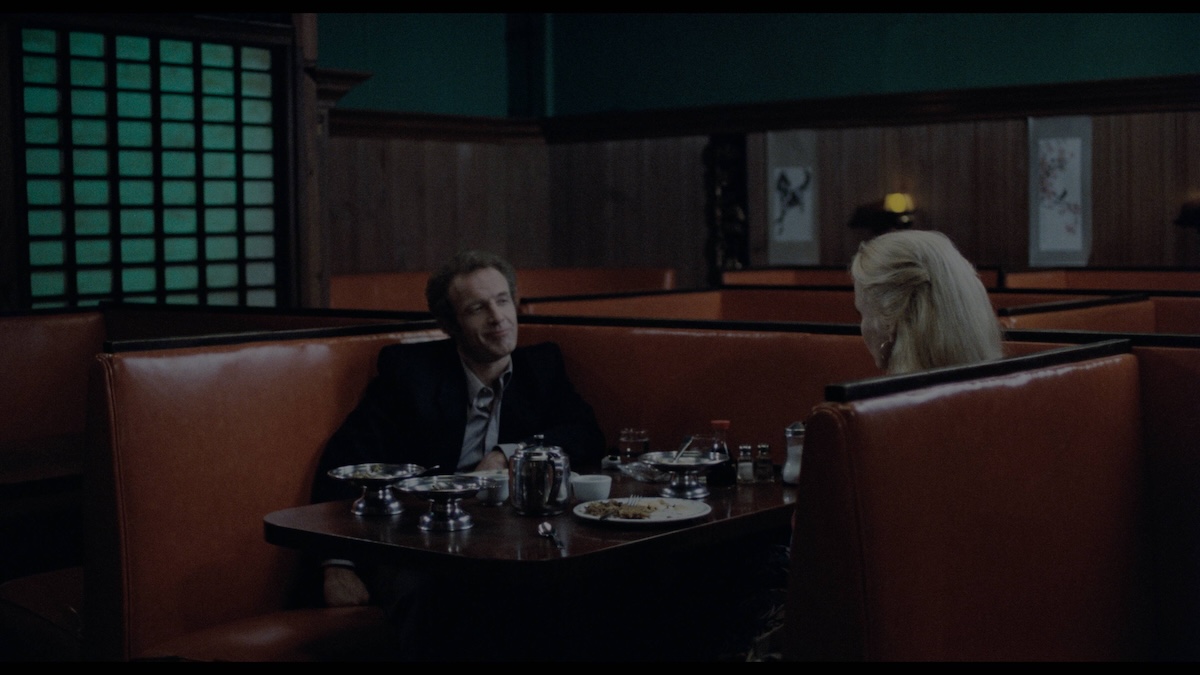
When Frank cracks a safe, it’s done with precision, Mann guiding us fetishistically through every step of the process. We follow a drill bit as it plunges into the steel, the camera venturing where we cannot, gliding through a perfectly round hole. David Fincher certainly must have had Thief in mind when he made Panic Room (2002).
Frank, wearing goggles and a boiler suit and bathed in a dark fluorescence of blues and blacks, uses a hammer and chisel to chip further away at the safe, a master sculptor at work. It’s effortful and time-intensive, but Frank must get in and out as quickly as he can. There is no time to sit around and admire his own handiwork. There is no dialogue for seven minutes, just the pulse of Tangerine Dream’s score. It’s the undiluted pleasure of seeing someone perform their job extremely well. Once in, he flings necklaces and jewels over his shoulder, the yield secondary to the process. As Tom Sizemore’s Cheritto points out in Heat (1995), “the action is the juice”.
Frank’s also an ex-con, initially going away for stealing just forty dollars, a sentence that snowballed into 10 years for a “manslaughter thing” whilst he was inside. He carries around with him a collage of the things that matter to him; it’s telling that he can fit it all on something the size of a postcard. Decades later, Max (Jamie Foxx), the cab-driver protagonist of Mann’s Collateral (2004), would gaze at his own totemic postcard, both men seeing visions of worlds in which they can finally quit the grind and leave the city behind.
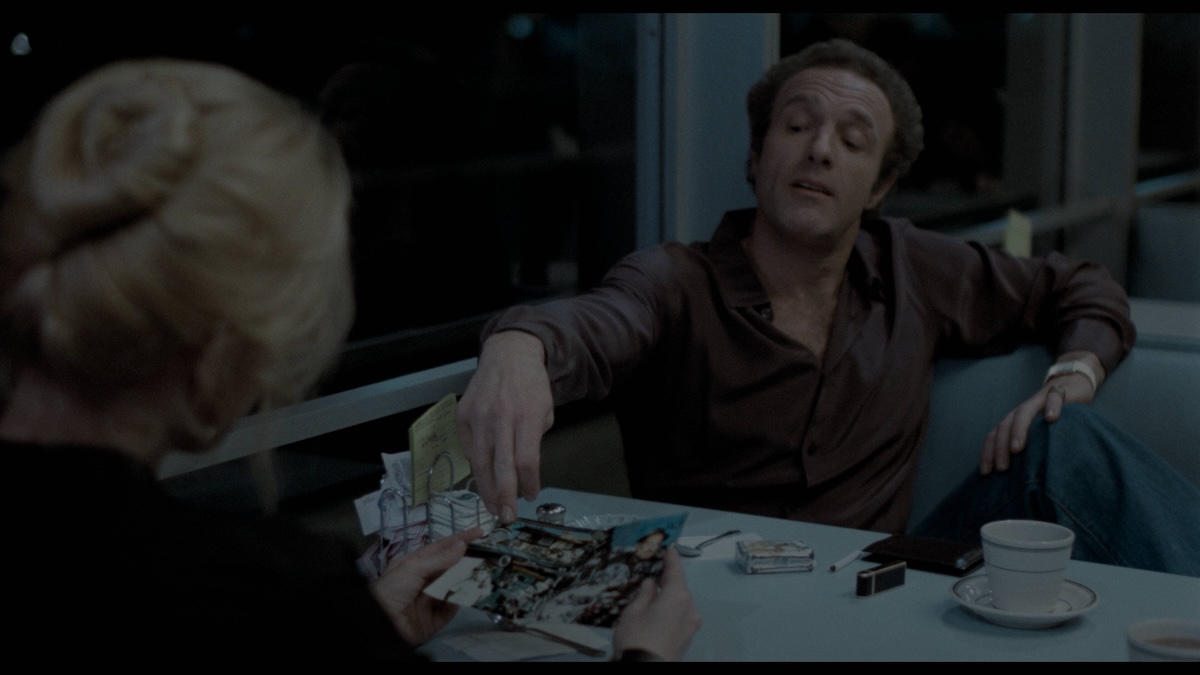
On Frank’s pocket vision-board is the face of Okla (Willie Nelson), a master thief and something of a mentor and father figure to Frank, and who is currently serving a stretch in prison for robbery. In the film’s most disturbing sequence, Frank visits Okla in prison, the two men sitting behind glass, Nelson twitchy and harried. Frank’s initial masculine jocularity gives way as Okla speaks almost in code about the reality of jail, alluding to endemic sexual abuse with the casualness of someone discussing a new coffee machine in the break room. “They’re putting a quality of guy in this place you wouldn’t believe,” he says with bone-chilling blankness, before revealing that he has angina and will likely die in prison if Frank can’t find a way to get him out.
Michael Mann, who also wrote the film’s screenplay, does not delineate his films by good people and bad people. Thief isn’t a film of law and order, saintliness and wickedness; it is, instead, an expansive gradient of blues and blacks, mixing and merging with no indication as to what is up and what is down. Mann does not hand-wring like many of his peers do about sin—there’s nothing Christian about his preoccupations or anxieties—and at no point do we sense that redemption is possible or even covetable for these people. You work, and if you get lucky you might one day retire comfortably, and then you die. That’s life.
It doesn’t mean there isn’t terror. Like any modern professional, Frank has fears, but they are earthbound. He may never get his house in the suburbs; Okla may die in prison; Frank may go back to prison. Frank takes cashier Jessie (Tuesday Weld) out for coffee, the traffic through the window behind them passing in opposite directions, and here he lays out his spiel. He’s been through hell, barely escaped abuse in prison, and survived the ordeal through his elevated mental state. He talks like a street philosopher. Time, he says, began to mean nothing. He doesn’t mark things by time. “You gotta get to where nothing means nothing.”
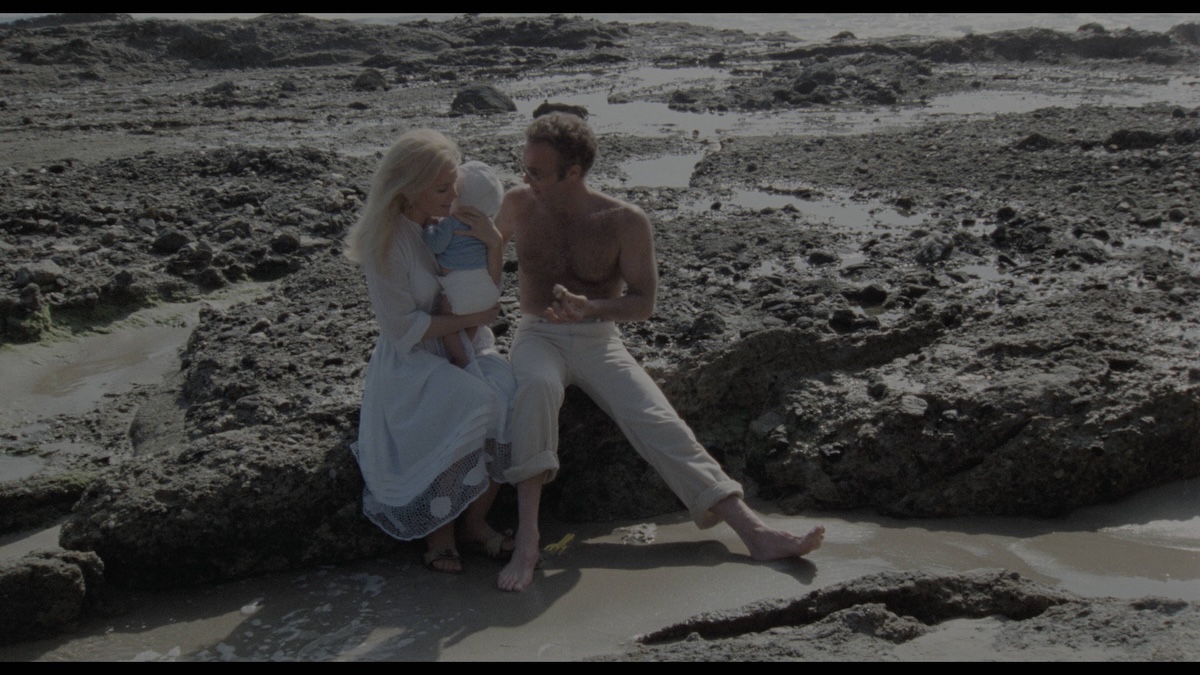
And if all this talk of assault, bludgeoning, and dying best friends doesn’t seem like incredibly romantic sweet-talking, it’s somehow at least vulnerable and honest. Jessie, dubious about shacking up with a man like this, can’t help but take his hand tenderly when he finishes his pitch: “I’m just asking ya.”
Frank likewise is the recipient of an offer he feels compelled to accept. He meets with powerful mob boss Leo (Robert Prosky), who offers him employment as part of his outfit. Frank would earn vast amounts of money under Leo and have the freedom to choose his own team for robberies. But Leo would be the man that Frank would ultimately have to answer to, his self-employment traded in for a company car and a regular salary. He would earn enough to marry Jessie, get Okla out of prison, and to settle in the suburbs, but would his life be his own any longer?
Regardless of career paths, Mann here gets at something universally familiar: the trading of our freedom for profit. Throughout Thief, there is the lurking spectre of ownership, whether it takes the form of employment or marriage, a stench of domination that Frank has been unable to scrub away since leaving prison. Thief was an independent production, purchased later by United Artists, and fittingly Mann’s film is concerned with what it means to be bought and paid for, what we give of ourselves to our work, and what we give up in the name of handing over control.
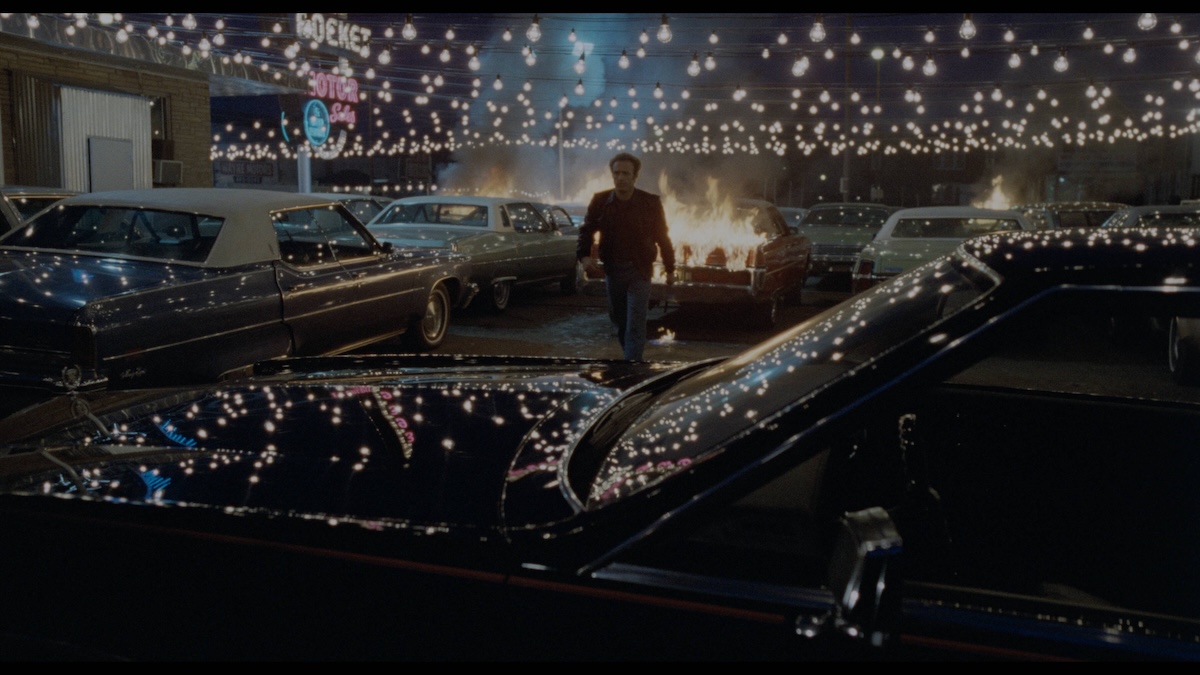
Robert Prosky’s Leo is the malevolent spirit haunting everything, coldly transactional in how he presents some of the most chilling prospects. When Frank tells Leo about the difficulties he and Jessie have faced in adopting a child, Leo tells him that the firm will take care of it. “You want a boy? We’ll get ya a boy,” he offers with terrifying calm.
There is a darkness that runs deeper than we can fathom, where trades are made, souls are sold, and people do unspeakable things to one another. Fixing things is as simple as bribing a judge. It isn’t paranoid so much as it is frank, plain, accepting of the way the business is run so long as you can get a good seat at the table. In professions as competitive as filmmaking and thieving, it’s about the work you do, but it’s also about how you use that work to get your foot in the door to something larger. Whether you like what’s on the other side is neither here nor there; there’ll always be a door beyond the next, and there will always be another job, even if you tell yourself it’s your last.
And what a job it is to witness. Frank agrees to a complex robbery of a large, heavily-alarmed bank. Here, in the mission preparation sequences, where the crew stand on rooftops scoping out the building, or where Barry (Jim Belushi) eavesdrops on radio signals between security guards, Mann hits a stride so exciting and confident that it transcends any procedural limits. It’s rapturous filmmaking, the operation itself stripped to elemental forces; the thermal lance that Frank uses to cut into the safe sends clouds of sparks raining out, as if he’s Prometheus stealing fire from the gods.
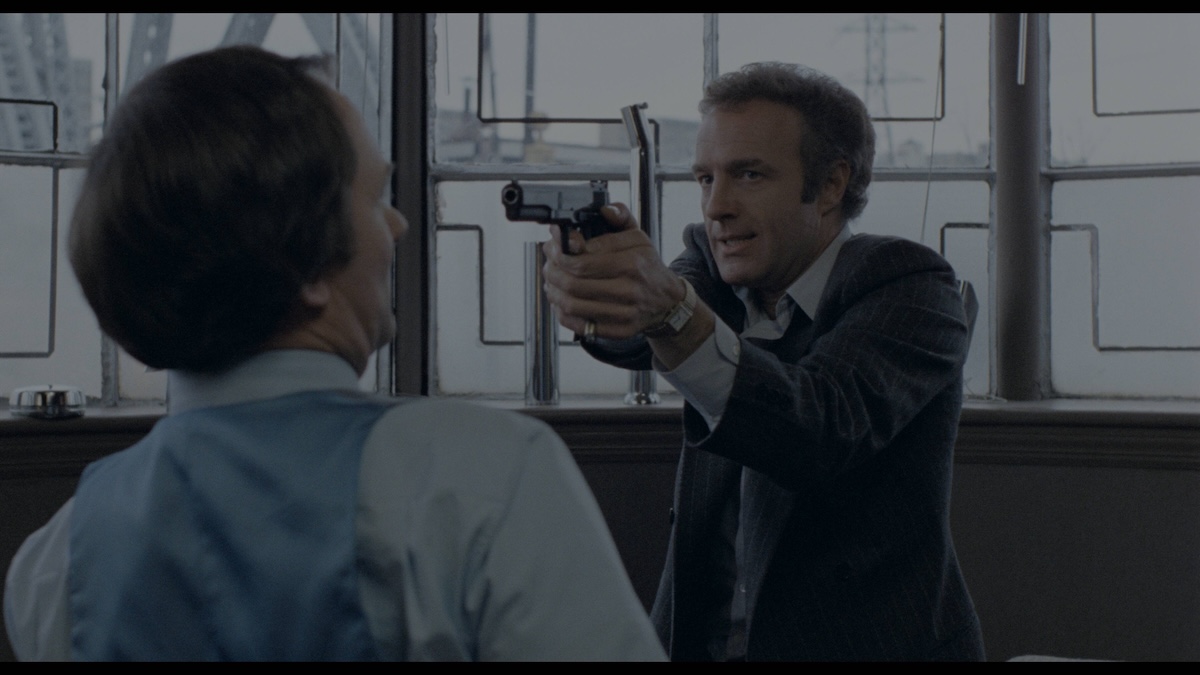
Mann and cinematographer Donald E. Thorin simplify the robberies to movements, shapes and colours. The music again drops out, and nobody in the crew feels it necessary to narrate the process. It’s pure concentration, with objects of steel colliding and penetrating, sparks and smoke all around, Frank like a swordsmith over his furnace, manipulating the elements to his will.
There are hundreds of films and TV shows about robberies that go wrong; Thief is a film about robberies that go right, but everything else goes wrong. When Frank is cruising the streets, neon flashing by in the gloom, we think of Crockett and Tubbs in Miami Vice (1984–89), and how when they drive, they are really just biding their time until the action picks up again. There is a restlessness to these moments, as if these men would explode if they sat still, a charge building as they silently consider the next move.
It isn’t that they don’t have lives outside of their jobs, but that life loses any sense of thrill when they are not the ones calling the shots. Michael Mann knows how to direct a film, and Frank knows how to crack a safe. But what would Frank’s life look like if he really did settle down? How long would it be before the itch came back? Father figures, wanted and unwanted, are littered about, Okla and Leo two sides of the same coin to Frank, as if some part of him quietly yearns for the easy option, to be guided through life, to be told what to do.
But as Frank’s control unravels, culminating in a barnstorming final act that is a sort of Western set in the suburbs, we are led to a sense of horrible, unchanging inevitability. People do not change, not when they don’t really want to. And if you possess a skill like Frank’s, if you are the best at what you do, then how could you ever willingly give up that fix? Thief is a film of addiction to that fix, of being too short-sighted and prideful to walk away. These are self-fulfilling prophecies, people making bets of their own volition, gambling away their present for the promise of another round to come, and the next offer that will remind them of why they took this job in the first place, of why they’ll be, in the words of Sonny Crockett, “a while longer still in this business.”
USA | 1981 | 123 MINUTES | 1.85:1 | COLOUR | ENGLISH

I watched the new 4K restoration of the director’s cut from the original camera negative for this review. Having previously viewed Arrow’s DVD of Thief, this was like seeing the film for the first time. The sheer darkness of the film is expanded upon and given gorgeous, inky depths here, which makes the colourful, brighter sequences even more arresting. The sparks during the main heist sequences look astonishing, while the colours are rich and evocative. In the scene where Leo roughs up Frank, Mann switches to a sickly green fluorescent colour timing which looks incredible here. The amount of detail is impeccable, particularly important for a film with so many extreme close-ups, of diamonds, drill bits, and of course, James Caan’s face.
The DTS HD Master Audio soundtrack is superb. Dialogue is clear and crisp, the gunfire has true heft, but most importantly, Tangerine Dream’s score—one of the finest of the 1980s—sounds miraculous. There’s a full, rich mix of the music, with the drums in particular having an expansive sonic quality. With the image and sound together, this is about as good as a film can look and sound at home. Incredible stuff.

director: Michael Mann.
writer: Michael Mann (based on the memoir ‘The Home Invaders: Confessions of a Cat Burglar’ by Frank Hohimer.)
starring: James Caan, Tuesday Weld, Robert Prosky, Willie Nelson, James Belushi, Dennis Farina, Tom Signorelli & Nick Nickeas.
